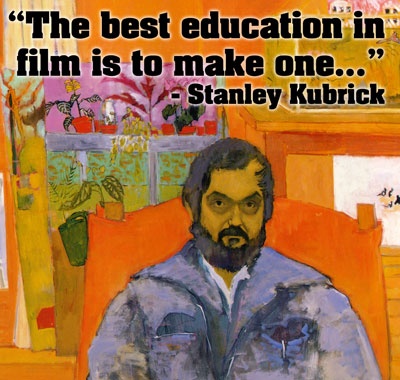People often say Stanley Kubrick was ahead of his time, but these quotes really seal the deal for me...


Quote: from Stanley Kubrick on 12:12 am on Mar. 19, 1970
I would advise any neophyte director to try to make a film himself. A three minute short will teach him a lot. There are a lot of noncreative aspects to filmmaking which have to be overcome.
But anyone can make a movie who has a little knowledge of cameras and tape recorders, a lot of ambition, and - hopefully - talent. We're really on a threshhold of a revolutionary new era in film.


 Bottom line...time behind a camera is learning time that won't be had with out being behind a camera.
Bottom line...time behind a camera is learning time that won't be had with out being behind a camera.

